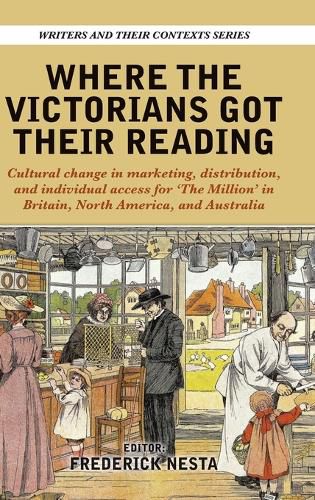Readings Newsletter
Become a Readings Member to make your shopping experience even easier.
Sign in or sign up for free!
You’re not far away from qualifying for FREE standard shipping within Australia
You’ve qualified for FREE standard shipping within Australia
The cart is loading…






This title is printed to order. This book may have been self-published. If so, we cannot guarantee the quality of the content. In the main most books will have gone through the editing process however some may not. We therefore suggest that you be aware of this before ordering this book. If in doubt check either the author or publisher’s details as we are unable to accept any returns unless they are faulty. Please contact us if you have any questions.
In the 19th century middle-class and elite readers were served by subscription circulating libraries, notably by Mudie's Select library and his bookshop, by Hatchards in Piccadilly in London and other retail bookshops. But what about the working man or woman who might have felt out of place in Mudie's or in a bookshop, or of someone who lived in a country town without a bookshop, in prison, or in the American frontier? Where did they get their reading material?
As these new essays show, there were many options: the second-hand trade, religious societies, free and workingman's libraries, railway booksellers, local circulating libraries, newsagents, direct mail, prize books, books distributed as premiums, street booksellers, and books sold by drapers, grocers, and other retail outlets. Books, pamphlets, newspapers, and magazines were readily available at prices that even working people could afford, and often for free.
The essays in this volume look at nineteenth century readers and the publishers and distributors who catered to them. Missionary societies and Sunday schools distributed tracts, Bibles, and prize books for good attendance. Subscription, and workingman's libraries brought books and periodicals to the working man, though that flow may have been controlled by middle- and upper-class boards. Penny fiction was available in many places besides railway bookstalls. Drapers sold books, often purchased from publishers who sold cheap editions to them and to street booksellers. Country grocers also sold books and even had lending libraries. Prison libraries provided inmates with books and periodicals, and humble Canadian tinsmiths were able to improve their lot by reading. And people loaned books and periodicals to their friends.
$9.00 standard shipping within Australia
FREE standard shipping within Australia for orders over $100.00
Express & International shipping calculated at checkout
This title is printed to order. This book may have been self-published. If so, we cannot guarantee the quality of the content. In the main most books will have gone through the editing process however some may not. We therefore suggest that you be aware of this before ordering this book. If in doubt check either the author or publisher’s details as we are unable to accept any returns unless they are faulty. Please contact us if you have any questions.
In the 19th century middle-class and elite readers were served by subscription circulating libraries, notably by Mudie's Select library and his bookshop, by Hatchards in Piccadilly in London and other retail bookshops. But what about the working man or woman who might have felt out of place in Mudie's or in a bookshop, or of someone who lived in a country town without a bookshop, in prison, or in the American frontier? Where did they get their reading material?
As these new essays show, there were many options: the second-hand trade, religious societies, free and workingman's libraries, railway booksellers, local circulating libraries, newsagents, direct mail, prize books, books distributed as premiums, street booksellers, and books sold by drapers, grocers, and other retail outlets. Books, pamphlets, newspapers, and magazines were readily available at prices that even working people could afford, and often for free.
The essays in this volume look at nineteenth century readers and the publishers and distributors who catered to them. Missionary societies and Sunday schools distributed tracts, Bibles, and prize books for good attendance. Subscription, and workingman's libraries brought books and periodicals to the working man, though that flow may have been controlled by middle- and upper-class boards. Penny fiction was available in many places besides railway bookstalls. Drapers sold books, often purchased from publishers who sold cheap editions to them and to street booksellers. Country grocers also sold books and even had lending libraries. Prison libraries provided inmates with books and periodicals, and humble Canadian tinsmiths were able to improve their lot by reading. And people loaned books and periodicals to their friends.